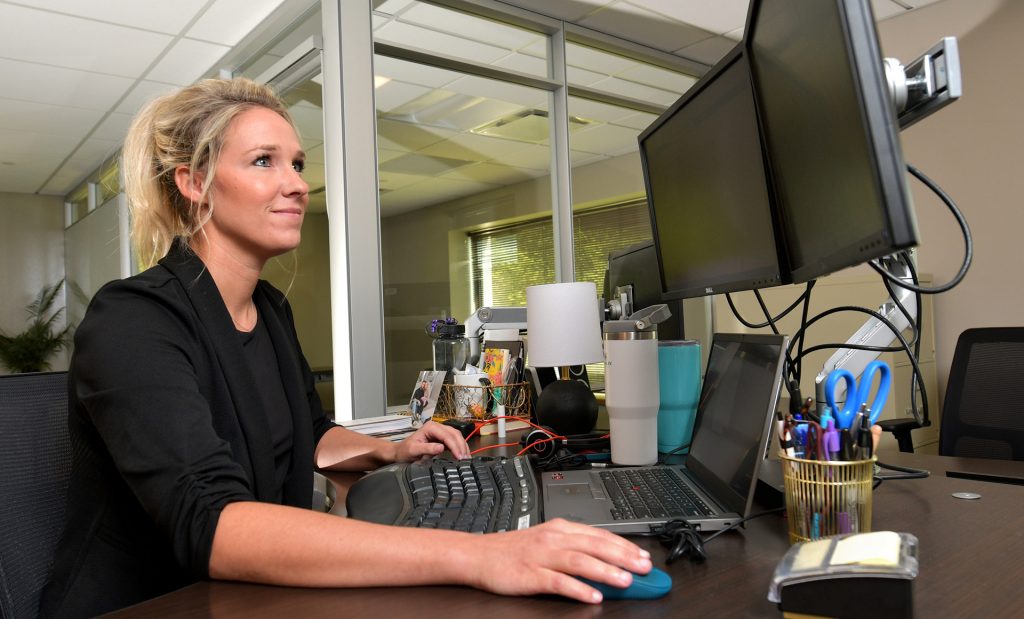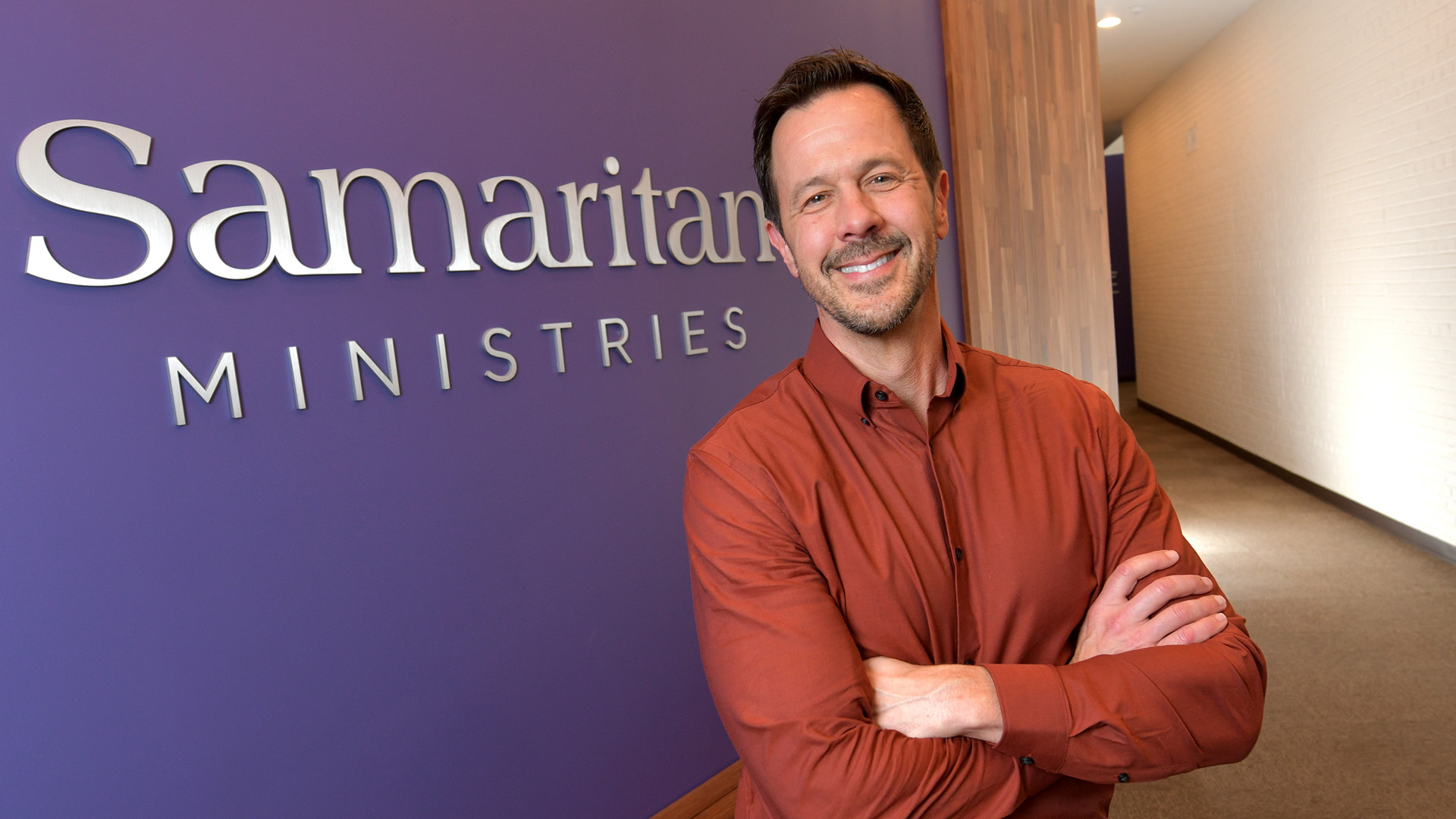Peoria-based Samaritan Ministries is part of a rising trend of health care consumers choosing sharing ministries to pay medical bills
Anthony Hopp turns a bit sheepish when recalling the first time he depended on Samaritan Ministries International to cover medical claims.
At the time, the Peoria-based health care sharing ministry, or HCSM — “We are not insurance,” the company’s website states — had been operating for just four years. Hopp and his wife had taken their 1-year-old son to a hospital for testing, diagnosis and treatment, racking up “thousands of dollars” in costs, he said. As time passed and the bills piled up, so did the couple’s anxiety.
“We were a little nervous about how these bills were going to be paid,” Hopp confided.
The doubt now seems misplaced, and not only because his son turned out to be fine. Rather, members of Samaritan Ministries are to trust Jesus Christ and each other to cover health care costs. Further, Hopp did not just belong to Samaritan. He was an employee.
So, he felt tremendous relief — along with a bolstering of his faith — as the bills got covered. Unlike traditional insurance, Samaritan members do not pay premiums. Rather, as directed by the company, they send monthly checks to other members with medical bills. Those checks often come with notes of encouragement and prayer.
“There’s so much blessing that’s not expected,” Hopp said.
A greater return on investment
Twenty-five years later, Hopp remains with Samaritan, as vice president and chief purpose officer. His family is one of 80,000 households and 265,000 people participating in Samaritan. They are part of what observers call an upsurge of interest and membership in HCSMs, which have swelled in participation to 1.7 million Americans. Many say they believe HCSMs provide a better bang for the buck.
With Samaritan, monthly costs can vary. But most households pay $596 a month (soon to rise to $634). Samaritan acts as a clearinghouse to review claims. Pre-existing conditions are not covered, and members are required to pay any one-time medical fees of $400 or less.
At Samaritan’s direction, payments are sent member to member. About $30 million a month is shared, about $1 billion every three years.
Those are impressive numbers considering Samaritan’s humble beginnings. It was started by painting contractor Ted Pittinger in his Washington home in the early 1990s. He patterned the organization after a predecessor HCSM, tweaking the business model before recruiting fellow believers, mostly in central Illinois.
Faith is key to HCSMs, most of which follow biblical directives. Samaritan requires members to not only attend a Christian church but provide documentation thereof from a pastor or other church official. Medical problems caused by the organization’s definition of immorality, such as substance abuse or extramarital sex, generally will not be covered.

Less overhead, little oversight
In fact, HCSMs are not bound to cover any claim. Though state and federal regulations oversee standard insurance, HCSMs, in that they are not insurance companies, do not undergo such scrutiny, including minimal benefits set by the Affordable Care Act.
The ACA marketplace looms as too expensive for some participants in HSCMs. In part, the lower cost can be attributed to less overhead. For example, with Samaritan Ministries, no more than 15% of total payments go toward administration. In the insurance industry, that fraction can go as high as 20%.
As budget-conscious consumers take closer looks at HCSMs, so are some states. That’s smart, said JoAnn Volk, a researcher with Georgetown University’s Center on Health Insurance Reforms. She believes many HCSM members don’t know what they’re getting into.
“There’s no promise to pay, but there’s all these (positive) testimonies,” Volk said. “(They say,) ‘It’s not insurance.’ I’m not sure if people understand what that means.”
In North Dakota, the attorney general’s office settled a suit against HCSM Jericho Share after alleging the HCSM falsely equated its services with insurance. Colorado and other states have expressed concern that insurance brokers have received bigger fees from HCSMs than insurers for bringing in new customers. And Trinity, an HCSM administered by the company Aliera, recently went bankrupt, prompting 14 states to take action to try to shut down Aliera.
Perhaps most problematic, according to Volk, is a lack of oversight of HCSMs. With laws essentially allowing the organizations to operate outside insurance-industry regulations, there is no way for Volk or other researchers to comprehensively analyze any HCSM for performance or value.
There is an industry trade organization, the Alliance of Health Care Sharing Ministries, that can vouch for an HCSM. But there is no outside audit involved, Volk said.
“I think we’re seeing a great desire for oversight by states,” she said. “But it’s still nowhere near what’s done with insurance.”
Samaritan officials claim otherwise, insisting that their ministry receives ample scrutiny as an IRS-regulated 501(c)(3) charity, along with additional oversight from the Healthcare Sharing Accreditation Board, a member-elected board of directors, and a randomly chosen 13-member panel that adjudicates Guidelines disputes.
‘Bearing our burdens,’ medical and spiritual
Though Volk has misgivings about HCSMs on the whole, she offers no particular criticism of Samaritan. In fact, one of her biggest peeves — insurance brokers who sell HCSM memberships, thus implying an equivalence of HCSMs with insurance — does not apply to Samaritan: The organization does not allow its plan to be sold by insurance agents.
Samaritan’s Hopp said his employer does not use hard-sell techniques to drive membership. Most of its advertising is by word of mouth, aside from a modicum of ads placed in Christian publications. Meantime, amid state criticisms of some HCSMs, some of those concerns may be legitimate, he acknowledged.
“What complicates this is some of the bad actors,” said Hopp, who expresses a belief that overall, HCSMs fill a real need, one that goes beyond health care.
“A medical need is a disruption in your life,” Hopp said. “There is an emotional and spiritual need.”
That is why Samaritan, in directing members where to send their monthly checks, often will provide information about the recipient. Though privacy is honored, many recipients want at least some of their medical information shared with other members, to allow prayers on their behalf.
That is what happened in 1998 for the Hopp household. Checks came with cards and notes of encouragement.
“They prayed for us,” Hopp said. “They cited scripture. There was this community that came together during that part of our lives.”
That sort of response and support also buoyed the household of Alexandra Hoerr earlier this year. The 29-year-old stay-at-home mom lives near Kickapoo with husband Brett, 30, who works for his family’s small machine shop. The latter enrolls all of its employees with Samaritan.
Hoerr has been pleased with the Samaritan plan. Her household’s biggest medical expenses related to her third child, which she delivered in March. Of $24,000 in total bills related to the pregnancy, the couple paid $400. As typically urged by Samaritan, Hoerr asked providers for cash-pay discounts, which can lop off anywhere from 20% to 50% of bills.
To cover the pregnancy costs, checks from members began to arrive about a month after each bill. With the checks came cards and messages with spiritual exhortations.
“It does mean something that people are praying … and the body of Christ is with us,” she said. “They’re bearing our burdens in a way that’s more than just financial.”





